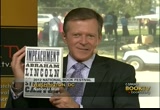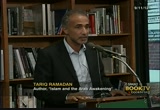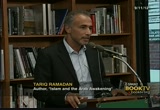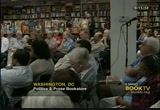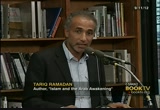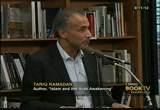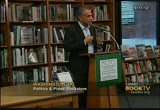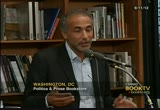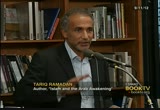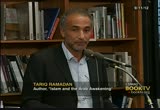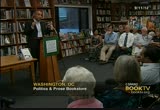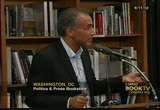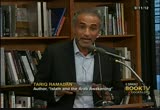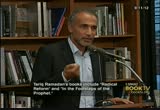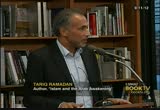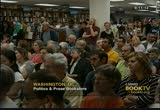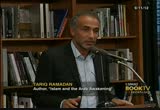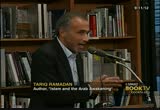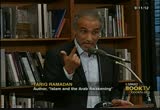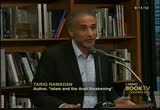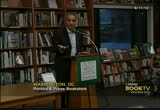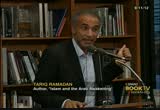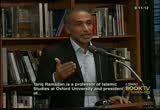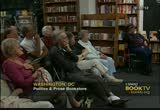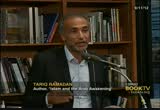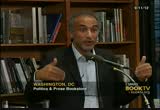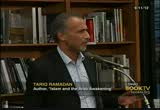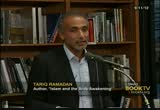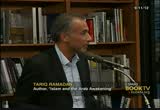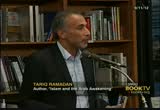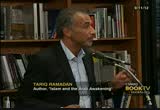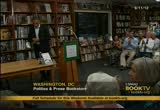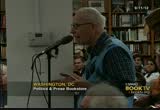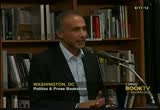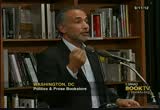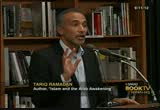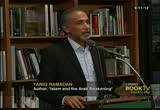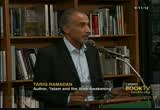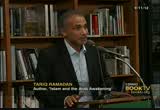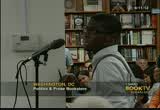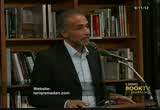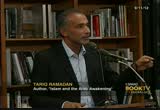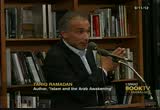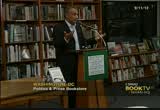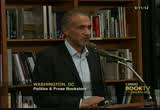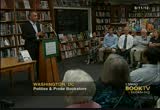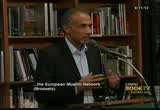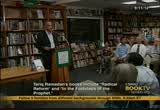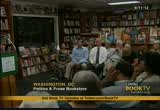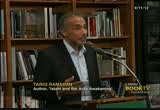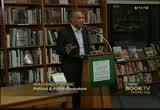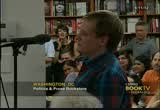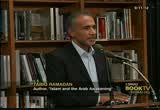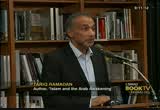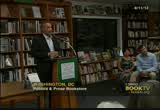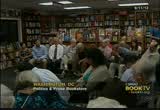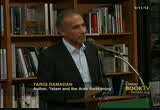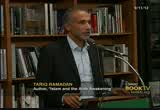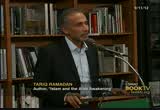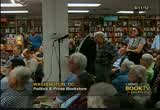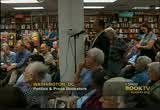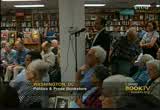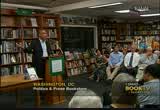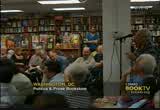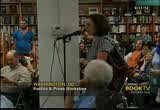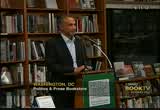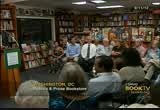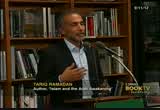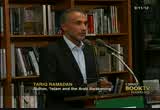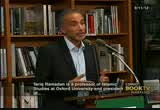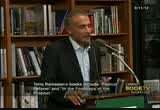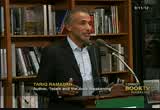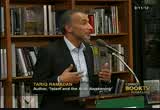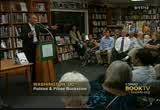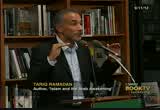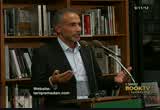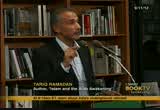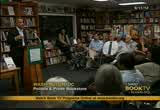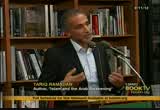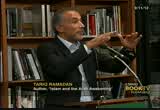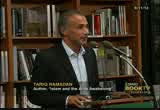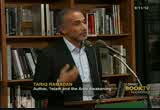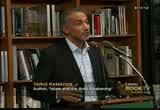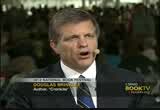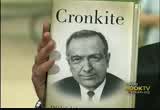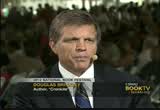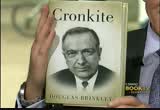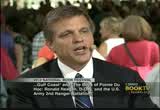tv Book TV CSPAN October 14, 2012 6:45am-8:15am EDT
6:59 am
7:00 am
you live in the united states of america and we all know the problem we have with our democracies now is not the decision of religions, but some decisions of transnational cooperation and economic power that are deciding without us being able to do anything. in democracy we are still dealing with powers that are beyond the democracy procedure. banks, transnational corporations, and we're facing with people are deciding. in greece, in spain, in italy we have technocrats are coming to solve the problem. we never elected them. but money is choosing them. so we also have to deal with the simplistic answer when it comes to separate religion from state, what do you have? directing the state or imposing decision on the state which is also imposing decision on to us as citizens.
7:01 am
so this idealization of the western democracy model i would say be cautious. we all have to do with problems and prices from within. so i wouldn't push the arab world to follow blindly the western model, but to be very critical and to try to take the best from the other models into drawing their own way. having said that, five main problems and i will stop here. the first one is really the discussion about the nature of the state. i was referring our began, referring to islamic state. if you listen now to what is coming from tunisia and what is coming from egypt, you don't speak about i don't talk the islamic state. they're talking about civil state with islamic reference. this is what they are saying. it means religion is not going to impose a structure.
7:02 am
having said that, are we playing with words or are we now really talking about something which is the state is a bottom-up delegation of power and religion is something, coming from on high and it has no power on the decision of the state. what is coming from the new islamist and even some sociologists are saying this is no longer islamist. this is post-islamist. i don't even know what started and when it's ending, but we have some problems here with terminology. the point is that they're referring to islam and the our critical question that we have to ask it when it comes to the prerogative of the state in which we are dealing with the principle. my point here is to say the muslim military cut should be quite clear on 69 principles, but for me are not negotiable. the first one is rule of law.
7:03 am
the second is equal citizenship for all, all the citizens, muslims and other faiths or no faith at all. the third one is universal suffrage. it's a majority. the fourth one is accountability. when you're elected you are elected, you have to come back to the citizens to be checked, not to be democracy elected for life as we had with us on and the family. so this is what we had with the world before. the fifth what is judiciary of authority. and differentiating the state from religion when it comes to power. meaning by this it's not because -- you are divorcing th two. in the united states of america you know the separation is exactly the same as european secretaries.
7:04 am
for example, when you talk about this in france, we are the only secular society. the united states of america is not a secular society because you have, you can't in france say god bless france. you can't say that. that's mixing, confusing everything. so even though you can think about it but you can't say it. but point is the relationship is important to is islamist majority countries, it can be separating without divorcing. to have a reference, and i'm very serious about this by saying religious people, christians or back or buddhist, i would like for our philosopher -- philosophical -- so it's not importing religion but it's having a reference in ethics, ethics. the separate religion from our,
7:05 am
that doesn't mean you don't have ethics and politics. so which kind of ethics in which -- what could be a reference is a very deep discussion and especially what comes to muslim countries. we have limits when it comes to freedom of expression and all the discussion that we have now in tunisia. so this is one -- so this is about the state, a very important discussion that we need to have. and we have now the islamist groups but also the secularist. they are not clear on this. because i was saying something and they were always justified the decision but being against islamist. it's not because you're religiously liberal that your public we democrats. some of the secularists were quoting decades for years, some of them. so they're saying to the west we are progressive, we are against religious imposition.
7:06 am
there was to porting some of them, not all of them. some of them were resisting. we have to be very cautious. it's not because we're religiously liberal that it into going to support the support i was mentioned now. i think on this we have to get answers from all the political actors in muslim majority country. the second is a very important one about the economy vision for the future. if you look at the islamist today there's something which is quite clear. they are all accepting the free market and the new liberal system. the first one is -- he is now making their what the e.u. didn't want him and didn't want turkey, okay, you will see. might be now that e.u. is much more in need of turkey and turkey as you see. and it's a very important point. why? because he's doing very well in the economic side.
7:07 am
is this the answer, do we want the markets to be opened and this is why we mean by democratization? or do we want economic stability? my point is the first to go to the imf, to the world bank and into within the system because we are proud of the future. we know that islamists are not a problem with the west as long as there are new liberal us and capless. we know this. you have an example. i keep on repeating this. it was said that i was banned from the states and then was removed. but i've still been from saudi arabia for the criticism i'm making to the country which is a lie of the united states of america. it's not a democracy. no one cares about the status of women in saudi arabia, saudi arabia now coming off qatar all the petro monarchies because
7:08 am
there protecting our economic interest. so you get the conservative there, you can ban women from driving cars as long as you're protecting our oil an hour economic interest. so at the end of the day, they are saying there is a democracy and islam, but they have the right to take the economy. we have to be serious about this. at the end of the day what is coming from him so must now is there not resisting the economic power, they are ready for it. it might be that this is the point here that because they are ready. if there is another thing which is important and economic side and this is why i'm saying about the arab awakening, it would keep on talking about the political structure another buffy economic challenges, we are misled in the whole discussion. my take on this is what is happening in the middle east is not for political reasons. i don't think -- khanfar.
7:09 am
the obama administration or the european administration are more happy with democracy than they were with dictators. you know, i think it's a question of interest. but what are the interests now? over the past 10 years, the chinese economic presence in the middle east was multiplied by seven. it's a very powerful presence. the three countries, brazil, india -- the bric countries, brazil, south africa, russia, are playing a very important role in the region. we don't talk about this but it's going, it is a shift year. for many reasons it's going to have an impact. on the countries, on the relationship between israel and arab other countries, because remember china has not the same relationship to israel than the united states of america. but this is a very big concern. what's going to happen in the
7:10 am
region. we have to take this seriously. it's not only political or economic. this is the second point, the economic vision coming from the arab world. when i was talking, to the current president in tunisia i was with him recently, i don't have a problem as long as they deal with rule of law and democratic transparency for all this is is fun. my main problem with them is not the fact that the refer to islam. i'm -- my main problem is take on economic liberal economy. so this is my problem. he's a secular he has a problem with islamists because they're very, very conservative on religious terms and very liberal on economic terms. it's the same with muslim brotherhood as you know, recently dealing with world bank and imf. second thing. third thing is about education. very quickly, this is where we need to have a very deep
7:11 am
discussion. there will be no democracy, no change over to work on education. i mean by education, education for all, education insulted to strike against poverty. it's jihad for education what you get something essential. this is what i'm saying about women. i was talking about the headscarf industry. i'm sorry, the only way you're going to evaluate and to assess empowerment of women, is on two things. has nothing to do with the way they dress. it has to do with access to education. and the second, access to the job market. this is where we want people to be. and the secular are not coming with answers and the islamists are not coming with answers that are credible and efficient on these things. this is a big question, what is your education policy. in of religion.
7:12 am
and on this is going to be a big problem. we have big challenges. the divisions from within the literalists and the reformists and the rationalists, the division from within and the big divide between shiites and shira would be a big example. arabs and muslims are not taking this seriously. we are facing a world culture that is very much -- if you look at the arab world we have a problem. the arabic language, arabic literature, the books, creativity, where are the clinics when it comes to movies, what comes to art, when it comes to entertain? what comes to the democracies? it's about being created. it's about producing something which is us, our perception of the world.
7:13 am
where is that? who's promoting this? it's a challenge. a very big challenge. we have to talk about us. we have to talk about beauty. it's part of the freedom. it has to do with a sense of belonging within the society and i think that is neglected in our discussion. and the last one which is a field that is coming out of all this process is something that is covering the whole thing, is the way we deal with corruption. it's the starting point and the end of the whole process. corruption is one of the main challenges in the arab world, at all the levels by the way. they say look at these people, they are so corrupt, but the daily corruption we experience in the arab world is something that we all know so we have to do with this. this is ethics, ethics of citizenship, ethics of civil society. ethics everywhere. this is the way i would take islam applicable of being a reference not by closing and being a framework where we can't
7:14 am
a just, but being a reference where these principles and objectives and has people do something which is the future. having said that, my last point is let us altogether celebrate the six principles i mentioned. celebrate the shift, this mindset, this intellectual revolution by saying one thing which is important. at the end of the day, we are promoting shared universal principles, but it's not about us. society for the people, which kind of democratic model they will have any future. this is their business. for the egyptian to find their political model which is referring to their history, their collective psychology, their culture. they need to find a model. it's not for us to go to iraq and say to people, this is the only right kind of democracy model unique because we know how it should be.
7:15 am
it's not. this is in frail -- this is still colonization. this is intellectual position. let the people find the model. let us be part of the discussion. this is why i'm in europe as well and i'm sharing this with you because i think all of us year as citizens we have a role to play. by being critical about her own experience as democrats and their citizens, by seeing in our society the failures, the undermine process of asking citizens and sing people deciding for us, by saying have to be critical and at the same time to be very clear on anyone who is not advocating violence but advocating freedom, dignity and equal rights has the right to be part of the political discussion in the arab world. it's not for us to say you are the good democrat or your the good muslim or the bad muslims. this is once again not going to help anyone in the future. thank you. [applause]
7:16 am
>> i enjoyed your talk very much. what i would like you to do is to talk more about bringing women into the running of things. because it seems to me that most of your religions, for instance, have nails in the lead role. -- males. it wasn't until 1920 that women got to vote in this country. so if you don't let them in, they just don't seem to have much influence. but if you do nothing and you get a different vision, from the mail. the males got a load of testosterone and and it's behind
7:17 am
all the wars we've had. it's behind a lot of the troubles with that. it's a crime and stuf so if you put the women in come your going to get a different viewpoint. at like you to comment on it. >> i completely, i completely agree with your conclusion. i would be more cautious about the biological explanation. [laughter] but the serious point here is, is really about women being much more involved. and i completely agree with it. you know, we have to be series about this. we have to rely on facts and figures when it comes to, when he society is doing well. if you look at all the facts and figures when it comes to education, for example, when it comes to agriculture, when it comes to every dimension of making decisions. when you allow the women to be involved, they are doing better than them.
7:18 am
the facts are you. it's an agriculture. it's an education. not only in muslim countries, not only in the global south. look at what is happening in the west. we have now women and muslim women being involved in education at the same level as men. those figures are clear. they are doing better than in an this is creating even problems within the muslim communities in the west because now they are more educated. so i would say that, and starting with this as a principle, it's very important to try to find a way to promote women. and i would say don't be misled by the supervision of what is happening in the muslim or turkey country. the uprising, women are very much instrumental in tahrir square, in tunisia. they were there. even in saudi arabia. even in petrol mortgage of women very much educated and being more and more visible. the point is to promote this through education and job
7:19 am
opportunities, and to get them not as simple. be careful with simple set up betraying the radicals on the ground. i think this is where we have to come together. but what i would like from us in the west is not to say the only liberated woman are the women who are like us. the liberated women are liberated women when they think, when they are empowered and they can be practicing muslims and liberated women. we have to reassess our perception of who is free, and how they are free. having started by this and this, we tried to have a critical discussion and to promote the rights of women, but i completely agree this should be done. and it also should be done in the way we deal with the religious scripture sources. i allocated one chapter on women and sing with two problems, reduction of the text little understanding of projection of
7:20 am
cultural on the text so the cultural understanding and went to do with this. it's a critical challenge that we have here. >> i spend about 90 minutes before you got here checking out various things in the book. page 81, 131, you seem to say that there's no way democracy can take root in the middle east. this is the palestinian problem is solved. my question is does that mean it will be israel's fault if democracy fails in affairs countries? >> i always agree with the first part and not with the conclusion. i said this, and let me put it clearly, very often to ask, in the middle east they are explaining all the problems that they have the middle east by saying israel is the reason. so the complex, all of our proms
7:21 am
are coming from israel. and i'm saying the opposite. i think israel and the problem we have with our lack of support with the palestinians is a conflict one, many other problems. so it's constant. if you are serious about democracy process, we all want what i just mentioned them all the challenges are there, that i'm not naïve. by saying, remember what israel said when the people were the most -- went to support mubarak and because there is a problem that everything which has to do with transparent democracy in the arab world will mean at the end a great majority of the people are not going to be happy with israel policy. and the israeli government. we know that. so if you want to do with democracy in the middle east, you better reassess israel
7:22 am
policy. and this has to be solved. because i'm not saying it's because. i'm saying it's the critical discussion that we had in the middle east here in what is happening in syria, what is happening in many countries around has to do with the palestinian issues. so at the end of the day my point here is to say that israel, and i said many times, and it is one of the facts i was banned by this country by saying the training of america should stop to support unilaterally israel. israel is not doing a good service to freedom, dignity and that the people in the region. this is my point. i stick to this. i'm not trying to say that israel is to be blamed for this, but if you want to go to achieve something which has to do with transparency democracy --
7:23 am
transparent democracy in the middle east, we have to solve the conflict in the way they are respecting the rights of the palestinians. >> sounds like a doubletalk. >> do you know what i -- no, no, no. i'm very sorry you in the like this. you know my answer to all the people are saying that i have doubletalk works i'm just responding. you might have doubled hearing. [applause] >> good evening, professor ramadan. thank you for your talk. i'm a research associate with the public law and professional policy grew. my question pertains to syria. how do you characterize the ongoing conflict there? recent news reports have characterized it as an emerging sectarian conflict. do you think it is a conflict
7:24 am
defined primarily in opposition to the government of president aside or do you think it's a more emerging securing conflict in the region? >> look, when i was writing on my website, i was trying to write every week an article about what's happening. for eight months the administration and the west were not really supporting a change in syria. you remember, that for eight months they're asking bashir to reform his regime from within. this is come from european countries and from the states. at one point it was part clear that the massive demonstrations were not to be controlled. so something has to be done because people are not happy with them. and then it changed because they had to deal with who can we trust in the opposition? because in the opposition with islamist and we have some are very much against the american administration. so they took eight months to
7:25 am
start dealing with opposition and try to find people they can trust. so, and the ration -- russian government and the chinese government didn't like what was in libya which after the non-flight zone does was used to injure and are completely dismissed and just nowhere in the living picture because now it's divided between the states, qatar, the united kingdom and france. so the starting point, about politics and geostrategy. what happened afterwards is that all the reading of this political challenges were we are in sectarian the bison, in my website and even when i wrote the book, i got so many criticism coming from muslims saying in fact you support the resistance because you are sunni.
7:26 am
and you like the monarchies begun on the other side people who are from the shia tradition are saying we support bashar al-assad because he is a supporter of palestinians and at the same time the shia tradition. and it became something which is sectarian reading of the whole thing. and i think it's -- i allocated one section in the book about this divide between shiite and sunni pricing is one of the great challenges of our coming years because i don't see enough scholars. i don't see enough intellectuals. i don't see enough public figures and people being ready to say she i and sunni -- shia and sunni, where muslims altogether and we have to stick to some principles. it's not because he's supporting
7:27 am
shiite -- he is a dictator, and just be some principles we have to get rid of dictatorship. and he has to be removed and to find a way. but i was exactly the same in bahrain. all the people, what was done in bahrain by saying you know what, shiites against sunnis so we have to accept what is happening. i'm sorry, that's not right. it's not because the people -- it's right for sunni to oppress them. so we have to stick to principles and come to shift principles that we have, but not play with intra- religious divisions that is now happening in the middle east. it's going to have a very important role between lebanon, syria, iran, and all the other countries in the petrol monarchies. some are playing a very, very nasty role i in the whole thing. in saudi arabia, qatar, are
7:28 am
playing with this now, and we have -- and some scholars are going with this. and i'm sorry, i think we have to be courageous to say that's not acceptable. that's not acceptable. we have to stick to principles against dictators, whoever they are and for freedom, for whoever are the people. [applause] >> mr. ramadan, the essence of democracy is popular sovereignty and protection of minority rights. given those principles, why should we have any optimism whatsoever about the creation of democracy in muslim majority countries, where god is sovereign and where these countries have an abominable history of oppression over religious minorities for centuries? and without oppression is evidenced today in a list of
7:29 am
countries, saudi arabia, iran, egypt, iraq. that's enough, yes. >> i think that we have to be very cautious not to take examples in history as defining a religion or civilization. because if i was to do this with the american civilization i wouldn't trust -- no, no, no. [inaudible] >> i would be delighted to debate our history of religious liberty as opposed to those of a country i have listed. you will see a tremendous -- >> can i answer? just ask the native americans how they were treated. but that's not the point. that's not the point.
7:30 am
the point is we have to be intellectually fair and equipped when it comes to being with history, not to reduce history to what happened and what we get now. because in the arab world for centuries, the jews and the christians were much more respected than they were in europe. if you're serious about the history. just look at the middle east were europeans had -- but the point is why should we trust now the arabs? i'm not asking you to trust. i'm asking you to be objective and to check, and to check what could be done. and if now you decide that the arabs, because they are muslims, are not going to respect minorities, that's over. but if now you get, from within the islamic tradition, you have a very long tradition of dealing with diversity, respecting
7:31 am
people from other faiths, and opening up to if you think this is possible, but i'm asking you is not to blindly hope, but to critically support. this is what i'm trying to do. so when you ask me, why should i trust, don't trust blindly. but please don't project onto them -- that are coming from very old wrong perceptions. that's the only thing i'm asking. >> my examples were very modest. i don't think you addressed my moderate examples i gave. the moderate examples i listed, saudi arabia -- [inaudible] >> i didn't say that -- [inaudible] [booing] >> this is an open discussion.
7:32 am
>> and go ahead. >> good evening. you mentioned -- [inaudible] >> you have seven people, 10 minutes. >> you mentioned -- [inaudible] >> go ahead, please. >> okay. good evening. you mentioned accountability in your speech. i want to talk about iran. three years ago the people attempted to rise up, the regime came and crackdown, murdered, raped, terrorized and attempted revolution failed unfortunately. why, in light of what you said, why do you work for oppressed tv, the iranian state broadcaster? >> if you read the book you will see that very critical about what happened after the election. the uprising that started in iran was elite students.
7:33 am
the way they were repressed and tortured sometimes is unacceptable to my take on iran is exactly the same as my take on any country. it's not black and white. with tv at two different to give people are conservatives and the people who are reformists. when i was talking with people, i took three months to decide if it's going -- the first reason is working with the shia country. by saying i'm not going to accept anyone -- because you're sunni you don't get there. i want to be a voice where we have a dialogue from within. envisaged are important to so something which is an internal discussion that want to have with shia. the second is that if you watch my programs that i've every week you will see the type of, the angle for which he come to the discussion. and also hoping and helping the
7:34 am
reformist tradition. it's not because, you know, we have a very demonized perception of a random that we have to reduce iran to one thing. we have people are working from within and doing a very good job. i mother son. i'm on the side of the people who are resisting the conservative trend and opening up towards more open to on democracy. and i think sometimes you have to be there and not to compromise. you see something there, also in qatar working there. many people -- qatar is also on political terms. if you read the book you will see that i am very critical. i will not compromise on principles. living in qatar, by being critical on the way they did in the event by being critical it will be the way to do with people from within that are supporting your principles. and is something i will never
7:35 am
do, is demonizing people in black and white. i've never when i was banned of this country, i never confused the bush administration with the american people. because if i would have done this, it would've been a catastrophe for the americans. so i think we have -- its series. why, for example, to go unseen and people are working and promoting the american perception? because you know what they're doing in the world. it's, by being critical, by sticking to principle, so no black and white political positions. but stick to your principles spend whatever makes you sleep better at night. used to work for mass murderers. -- u.s. steel work for mass murderers. [inaudible] >> thank you, country. i'm glad you're able to be with us tonight. my question for you related back to the comment you made earlier
7:36 am
today in which he mentioned the arab revolt, the arab awakening as you call it is not about us. we tend to be somewhat basically can do slew everything. i know the arab awakening is not about americans or people in europe in particular. at the same time if you could deliver two president obama or a member, you know, a leader in europe sort of a one or two minute sort of policy position as to how they could create a consistent position of cross country, talking about egypt, syria, bahrain, in terms of encouraging these progressive things we've seen over the last 18 months, what exactly would you say to them? thank you. >> in one minute, i would ask for three hours. anyway, look, i think that there is only one thing that want to say to any inside government. is really be consistent with the
7:37 am
principles. this kind of selective approach when you support to cater sometimes, you support democrats sometimes. in fact, the only thing that is important for you is your short term interest. this is something that ended in what i can she. this is counterproductive. so i think the american government, people very happy with obama being elected. now they're quite disappointed with what was not done. but in the end, the united states of america has a very bad reputation in the arab world. it's wrong sometimes and sometimes it is right the way to deal with people. the way they are neglecting people. i'm sorry, you know, when you read the newspapers and you watch tv, you have a sense that a lot of arabs is less viable than a lot of americans. and if a civilization is giving -- there's something wrong.
7:38 am
but you have to value all the people. you have to value innocence of the arabs as much as you value a lot of innocent americans. so i would say to the president, because you stick to your principles and support more the people, less the armies. even in egypt. and be consistent with israel and the palestinians, and be consistent with anything which has to do with transparency and no corruption in the muslim majority countries. consistency is the problem. >> thank you, professor. >> i'm trying to emphasize a quite complex idea. i welcome you here. i welcome your ideas, and i am also not from united states of america. i'm from dutch caribbean.
7:39 am
i must say we share certain things. but the first thing i would like to talk about is the arab awakening and the issue of the revolution of the arab awakening. how do you see -- in my opinion the way this is seen and even talked about here tonight, i think you try to deconstruct that way of thinking. what i see is an attempt on the part, people in the periphery. going back to come in my beloved caribbean the haitian revolution. people trying -- people trying to resist was going on and trying to find models. you have talked a lot about it. i would like to know maybe some ideas of sudden more people inside, you know, turn the tables do what you talked about what they are at this point in
7:40 am
time. you have talked about some vision of the arab democracy, economic policy. that's the first thing. the second thing, second idea, the second equation is important because where i differ with you, where i differ with you is on the notion that if there is a revolt in my part of the world, and if the revolt goes very, very bad and violent dictatorship there, that somehow we should say back office, if we can find international some ways to humanely intervene, and i know this is a horrific problem because there's a lot of things behind intervention, to put much more democratic will use indigenously involved and indigenously grow it, that's what i would go forward. >> very quickly about your question. the first one i think back, i agree with you. i think there's lots of intellectuals and mainly among
7:41 am
the young generations, women and men are coming with a vision that is quite interesting that we have to support. so, you know, after the uprisings we had scattered, the power of the movement was they knew they were against the dictators, beyond any political affiliation. the weakness of the whole movement is they don't know why, what they wanted afterwards and they were stand for what exactly. so i think that our intellectual, that still they are trapped into this simplistic polarization very often, and what i hope is to see much more discussion and critical discussion. and this is where, from where we are, we can be part of the discussion in the policy. the second question about if we have to be involved, i think we have to be involved. we have to ask ourselves in
7:42 am
which we we have to be involved. because in the case of libya, for example, the way it was -- i myself, i was -- cutoff edges of the day before were going to gilad people in benghazi. and when the top is saying he's going to kill, he was going to kill. so still what we have to do, i was for no-fly zone, but i wanted us to do something. and i think that today in syria is very, very, very, very disappointing to see that we're not doing anything, as if we agree to disagree on this and to let it be the way. so i'm not saying we have to be passive, but we have to be respectful and we have to now with whom -- we should not intervene to protect our interest. in libya it was quite clear that this was a deal between the
7:43 am
united states and france. and i think in syria have to care about the people who are being killed and that only about -- which i think is the case today. >> i'm a journalist from egypt, and return back again to cover the dilemma between the islamists and secular. you said that -- [inaudible] >> islamist background. this is not the case. do you think that [inaudible] which i think i think would nott in the upcoming where we still have problems? >> thank you for this question.
7:44 am
first, what you are saying about the muslim brotherhood and what happened in the '30s and '40s is right. [inaudible] >> let me finish. he was talking a change in reforming the role of the family and society, and in in to get the islamist state. and this was against the british presence and to deliver the country to an islamist state. that was good but if you look at what's happening now within the muslim brotherhood you cannot see the exact same discourse. you can't say this. you might think they are changing working in the same intention, but what was said recently is given by morsi, he said a clear, it's a civil state. he said it publicly. some no, you have to acknowledge that he said it. my main point is, once again i'm not asking you to trust what they are saying, but when you deal with any political movement, you have to understand that they are getting with
7:45 am
pragmatism. transport when his first talking 10 years ago, no one trusted what he was doing. is he now changing words and having the same intention? we have just to let the people do what you want to do and we will check their behavior. not just question their statements. today, the muslim brotherhood have changed. yesterday they were talking about democracy. they are talking about democracy. they are talking about citizens. it might be a single strategy but it might also the beat of their change from within because the muslim could -- muslim brotherhood has changed many things. we have to check this on the ground. we cannot just decide itself politics but it's the exact the same with many of the people. some here. anyway, we have come we have to
7:46 am
look at -- no, i think it is fair enough, it is okay, are you change, yes or no? we had discussion with many other people. and even within the muslim brotherhood it is scattered because the young generation is not following the older generation to the eye movements and sanctions from within. we have to check this. they are not only colonized with the old position. this is also what i'm asking. i'm not trusting the word. i want to see this on the ground. [inaudible] he came with good questions and i think, i'm very much in touch with them. i'm reading what he's doing. esm positions that are questionable, and some good questions about this as i can about what do we want to do with the muslim society. and i think the answer is coming from him. the answer will come from the discussion the critical discussion between his position and others. because he's not only accepting the secularist approach but it's
7:47 am
also critical. i think the only good answer is going to come from critical discussion between political agents and actors in this society. [applause] >> i will take to question very quickly and then -- [inaudible] >> can i -- i can take you and to other women and that's it, okay? >> good compromise. professor ramadan, just a question that is on in the headlines every day, the issue with a nuclear policy of our render i would like you to comment on that because it seems to be, it's got a life all on its own.
7:48 am
is moving along, and i'm troubled by it. >> i will take the two of the question and them together. >> so i talk with them and seem to answering similar question. i was in egypt for three and a half years up until december 2011, and have the privilege and i call it a privilege to have watched the revolution in egypt to it was a privilege to know such democrats and advocates for democratic reform. the follow-up to this is assess come to this event there's news coming from cairo that is going to be come probably going to be all over fox news today and tomorrow and the rest of the week. and that is that the embassies, u.s. embassy in cairo, they were scaled. so you guys know. apparently the u.s. flag was taken down from the us embassy and in cairo, and instead there
7:49 am
was only one god, allah, and muhammad is his messenger. and this is scandalous in terms of, we see all of this democratic form and we want to believe in in all of this really inspiring sort of movement towards democratic reform and then you have this and it's going to be all over this. it would your response be to all of the things are likely, the comments are likely to come in the next week's? how would you mitigate between -- excuse me, sorry. mitigate between the freedom of the press and freedom of religion and -- sorry, i'm a little confused by these guys. freedom of the press and the respect for religion, the conflict in some ways that's going on in the middle east. >> there is one more.
7:50 am
>> i'm a student at george washington university. i'm exchange student from cairo. my question is basically about, again being a practicing muslim woman in egypt. we saw the amazing like the revolution. we were there in tahrir square but two months afterwards there was a woman's right, the international women's day, and the women's march that they were attacked. i understand growing up in cairo and now all the different cultural ideas relating to women, i know this going to be hard for them to be worked in during all things related to the revolution and the id of civil liberties. but at the same time if we say that education is the only thing that is going to help the country change that, is that going to be possible with the muslim brotherhood trying to also influence the culture in egypt? thank you. >> he told me to, i took three.
7:51 am
i go ahead? okay, one more. >> i will just makes it -- make it fast. i read from some scholars that revolting against the ruler is not something that is good. that there were some -- muslim should not revolt against the rulers wanted to know your opinion about revolutionary on your point of view. >> that's going to be another lecture. okay, let me start with the first question which was about iran and the nuclear weapons. i think that we have here to positions, one is from within same we are not doing this. it's not our project. it's not about -- and this is
7:52 am
what is said on the government on the other side, what is said is that it's only for nuclear weapon and the army. i would say here that there is something which has to be clear, that for me first the position of principal is that anything which has to do with nuclear weapons should be abolished and stop. but not only for iran. i would say for all the countries. [applause] >> because it's very easy, it's very easy to target iran with just new to of any of israel that we're not talking about it, and even the united states of america and european countries, they are lecturing iran why they are having it. and i think that we have to come with a consistent take on the whole issue. now, to use what is happening
7:53 am
now, for us to go attack iran and the current israeli administration wants to do that, that's not acceptable. and i think that they are trying to do it now in the time were american administration and the current president is weak because it's just before the election so anything could happen with netanyahu administration, not only because of him, because of the people who are working within. i think we have to say no to this. so to say, you know, i wouldn't even advocate nuclear use even civil side. because i am not supporting this. i would try to find alternative ways of keeping with our needs on that. but when it comes to differentiating between the weapon, between the army use it or the way it has to be done in
7:54 am
a civil way, i think that has to be checked, but we cannot launch a war on the terms that we have now. so it's not acceptable for anyone, but at the same time the right we are getting to something we should also ask ourselves why the is a lack of consistency in our policies in the region, and this is not helping the region to find solutions. so this is one. the second is about what is happening in egypt and -- what exactly was the point you were making, is -- yes, what is happening at the american embassy. i think, of course it's going to be used by the media. going to be once again use by people are saying look, even now what we think about the uprising, it ends up with people being against the west. which insight was very, very
7:55 am
much positive in the whole process, no slogans against the west. no slogans against the united states or european countries. it was raining much against mubarak and regina. nothing against the west. this is very powerful because it was an internal talk and slogans that gave the dictator. now get people coming and they're trying to unsettle the whole situation. let's what is happening in tunisia in tunisia with exactly the same -- [inaudible]. it's not a dirty word. sometimes we call them -- so there are literalists and the right name, this is the way they're calling themselves. they come with a very black and white. they are changing their position. for years they were not involved in politics. they were saying democracy is
7:56 am
nothing to do with islam. now in the last election in egypt, in eight months they changed their position and they got 24%. who is pushing these people? who is pushing these people in tunisia? who is pushing them out in egypt to do things like this? to put the government into a situation where they're facing problems because they don't know if they are dealing and playing on the religious credibility. in fact, [inaudible] where we have the credibility and we are, you are not tough enough with movies and freedom of expression, so we are the protector or we are the guardian. so they are creating divisions from within. it's going to be very difficult, so it's going to be used by the populace for the neocons, you know, what we had in the west. but it's used from within. so this is our position, and
7:57 am
this is not to fall very quickly into this trap by saying oh, this is starting again. it's to understand that from within society there are people who are pushed and there are trends that are supported in order to create divisions from within the society. and this is why we have to say clearly once again, it's a question of consistency. a way you're acting against the american embassy is not acceptable. the way you're acting against with freedom of speech is not acceptable. at the same time we want to know who is behind, who is financing this. rand corporation was just telling us before the egyptian election, before the egyptian election, saudi and qatar corporation for putting $89 supporting the movement. so you are helping the people -- $80 million supporting the movement. you're supporting the more conservative trend. what are you trying to do that?
7:58 am
dividing. it's division. so it's complex because what was yesterday the hope that they can be unity around religion, navigation with it. going to destroy. the problem. so i would say the only answer i could have to fox news and others is to explain, and by explaining am not going to be heard anyway. so we tried to explain it to we have to be there to be critical and the citizens. it's very important. at the end of the day my game is ramadan. but what is very important for us, a series about democracy, is americans and europeans and question people be able to say this, being able to come with something which is a more sophisticated approach of the arab world. so at the end you can do much better than anything if you have
7:59 am
basic knowledge helping the people to understand which is complex but you're not doing this. it's very easy to sit in here and to say, the obama administration at our government is not doing the job i'm asking the american citizens at the end of the day, what are you doing to help with this complex issue to help support democracy everywhere. if you are series about democracy, you have to be series about democracy. it's about tensions, it's about understanding from behind the scenes what is happening. so this is one answer to this question. the third question was about what you are saying about -- once again, if you go on my website you will see, i think it's in the book, i'm not sure it's in the book because it came up after the book was published. i wrote the paper called playing with islam. you should understand that some of these trends are coming from muslim brotherhood and others.
8:00 am
they were so much protected and demonized that there is an obsession that we have to be acknowledged. so the west is very important to be democrats, to be open, to be open to the civil society. so that is something which is an obsession of recognition. but at the same time from within the society that the problem of credibility, that they are the guardian of the religious reference. ..
8:01 am
whether you get religious credibility by traveling but the letter is or by being faithful to the principles of what we are talking about the equal rights, social justice, which is why we have to challenge the people. but the problem is something which is the most important disease that we have in the arab world, which now is becoming international. it is emotional politics. it is we are triggered by promotions. so this is the way you can play with this and this is exactly what the popular searcher with searcher with us in the west. they are paying with our emotions to be scared of the other cannot be scared of muslims, some words, listen to jihad, sharia, the emotional paglia politics is populist you
8:02 am
we have to be equipped. when you intellectual jihads. [laughter] i mean it. in intellectual jihads is really if we are serious about democracy and rights, we have to understand the meaning knowledge, understanding complexity is really don't get it so quickly. commotions are misleading in the way we post others. in some muslim countries we say you are westernized. i'm not saying this because i come from the west. you are not expecting the muslim principles. you are being reactionary because you are on the defensive. so the less you are western from the more you think your muslims. that's wrong.
8:03 am
that's completely wrong. so we need to be equipped with this. having places saying i'm a practicing muslim. the principles advocating to tell us what is the true islam and the rate is on we have to advocate. the last question was about dealing with power. the philosophy is that the licorice has a very old tradition and you have it in christianity, even in buddhism, that when you are dealing with power and if you're serious about your religion come you never resist power. he never challenged the power because his power is given by god. so you have religious discourse. even the philosopher was seen if you are doing better deal with a bad leader than to create the
8:04 am
revolt that was worse than it was before. better stability than revolution. so we have many interpretations. but you have also other interpretations saying when you have a just later, you have to resist and move him because he has to be accountable. you cannot accept it and just later. that means you have to choose. this is important. revolution is not always as easy as you can celebrate revolution. the nonviolent ways. i think that we meet today, and i wrote about this in many of the books. for example, even in my way of resisting what is happening in israeli-palestinian conflict, might pointless and we had what happened as a global movement of nonviolent resistance to israel.
8:05 am
nonviolence is something very powerful now and yet so many means. so sometimes you have to do with the means to understand nonviolence is important. these demonstrations were successful because they were nonviolent. i commencing the weapons were not going to use them. i think that this is powerful. what is happening in syria is people giving them weapons and seko, cochair. connecticut for monarchies given weapons and support it buy weapons. retrieved the means. so you have to think about that. so this is where from an islamic is revolutions could be a means if there is no other way. but we need to think about how do we get to resistance, nonviolent resistance, education and this is also something we also have to tackle.
8:06 am
which kind of education retailers. the muslim brotherhood or is never, never perfect. we have always to reassess because islamists have a specific way of educating. but traditional islam, i was very concerned as an islamic institution with their teaching, for example. so in the way we are coming with this understanding, it's very important also to connect at six with the way of understanding that she don't only have rights. you have to do some of the duties is to be the counter power to power. my last article on the website is power of country powers. in which we resist power and has to be self-critical as well with yourself and with power. this understanding from the islamic respect to this something we have to write, that
8:07 am
we have to promote and it's not at all based on principles. quite we have to say. it's very much something you find in our traditions. it is fairly a contradiction in terms to say i'm a practicing muslim and i will keep quiet in front of me to teeter. the only right way of beating the men and women of faith is to be courageous, to speak the truth, to say a word of truth tyrant. and that means sometimes eschew having our used to be courageous. i would think the americans to be a bit more courageous with the government. [applause],
8:08 am
>> doug brinkley, has risen book is this "cronkite." one word. if you have to discuss what toot i in america, how would you do w it in 20 words orar less? >> 20 words or less, most trusted man in america became his word.sure to b os was great pressure to be m called the most trusted man, bua he carried our country through things like mercury and gemini m and apollo missions had their heyday. he was the voice of the civil rights movement to the vietnam war, watergate, nixon'spers recognition. he was the person who brought menachem begin in and were sar h that together come which led to the camp david peace accord. so some of broadcast journalism, the big three are edward murrow, walter cronkite and mold thomasd >> how did he get to be thatwire
8:09 am
guy? >> he was a good wire serviceteu reporter. the wire service for the uniteds press county had two condenser a stories. you are given about a thousand so words in your camp at a lot of adverbs and adjectives in it, sl he learned howy to write a unknowingly, though the wire service is perfect forth television really have 15 minutes or half-hour news broadcast. the writing has to be tight and get to the throw lose lange aroun point precise. >> host: doug brinkley, was he political? >> guest: cronkite was a new deal democrat. he was -- >> host: was that known? >> guest: . no he became a fan of franklin roosevelt, cheered for him as a boy growing up in the 1930s. in the 1950s some people thought cronkite he was republican because the founder of cbs work directly for dwight eisenhower, and ike, personally loved walter cronkite so when you have the
8:10 am
20th anniversary of d-day, dwight took cronkite there. so there is would feeling cronkite might be a republican but the vietnam war showed him to be a liberal, and he came out publicly saying, i'm a man of the left, in a speech with barbara jordan. >> host: did that hurt him? >> guest: no, because at that time he had stepped down as the anchor manin' 1981. he played mr. objective quite bell, and if you go to a doctor and are getting surgery you don't care if the doctor is a democrat or republican, but when he came out and voiced some disseptember own the vietnam war, it was the beginning of him editorializing, and today we see people in television who are editorializing all the time, and that's a slippery slope we're on now. and also, you see, with cronkite
8:11 am
the berth of celebrities and television. where cronkite would go to a rally with senators and people running for president, everybody bum rushed them. they wanted to meet cop cite, not a senator from wisconsin. >> host: how would you describe him as a private person? >> guest: a lot of fun. he could not stand pompous people. at parties he would trunk a lot, sing old time songs, sometimes take part in a strange kind of strip tease act just to get people to crack up. but that's why -- i interviewed so many different people, from his good friends on he left. likicy buffett, to on the right, all the reaganites liked walter cronkite to know him is to like him. >> host: what is or was your connection to walter cop
8:12 am
cronkite? came to a book party for my biography. he thought i was david brinkley's son, which i am not. and i had to correct him. then later we would have lunch with arthur schlessinger, jr. in new york, and i got to know him and he did a blush for the history of the united states. he knew i was doing my book before he passed. i was with him six months before his taught some some dementia was setting in, and he was -- >> host: this book came out five or six months ago. what's the next book for you? >> guest: well, i have been working on what i'm calling the wilderness cycle. conservation history but i like the wilderness more than conservation, but i did the wilderness warrior on theodore roosevelt, and then the quiet world, on saving lack
8:13 am
wilderness, and now i'm writing forester in chief, franklin roosevelt, the ccc, and wild america. i'm looking how fdr and gifford-pinchot got two billion trees planted through the youth car in the 1930s. so i'm waiting of the death bowl. everglades. >> we were indicating before this interview, you were telling me you spent seven hours with neil armstrong. >> guest: i did. i grew up in ohio, and i don't have time to get the detail but i go to be do the official history for nasa right after 9/11, and he doesn't like talking, mr. armstrong, so i was able to burn some tapes with him, which i'm very proud of. rosenthal, an editor of news week, tune out about and it i wrote a little piece -- a long
8:14 am
piece in "newsweek" about neil a remember strong, and my university rights, we celebrated the 15th anniversary of john f. kennedy challenging america to go to the moon on the campus i teach. and kennedy said we go to the moon because it's there, and listening to kennedy years about the moon shot, you wonder why politicians today don't get behind a war on cancer or don't talk up a going to mars or something. we seem to have lost that sense of bigness. hopefully it will come back. >> host: we've been talking for a short time with doug brink eley. his most recent book, cronkite, and we appreciate y >> one of the things that i hope most here is that my father taught me to value education. and he was such a tyrant
214 Views
IN COLLECTIONS
CSPAN2 Television Archive
Television Archive  Television Archive News Search Service
Television Archive News Search Service 
Uploaded by TV Archive on

 Live Music Archive
Live Music Archive Librivox Free Audio
Librivox Free Audio Metropolitan Museum
Metropolitan Museum Cleveland Museum of Art
Cleveland Museum of Art Internet Arcade
Internet Arcade Console Living Room
Console Living Room Books to Borrow
Books to Borrow Open Library
Open Library TV News
TV News Understanding 9/11
Understanding 9/11